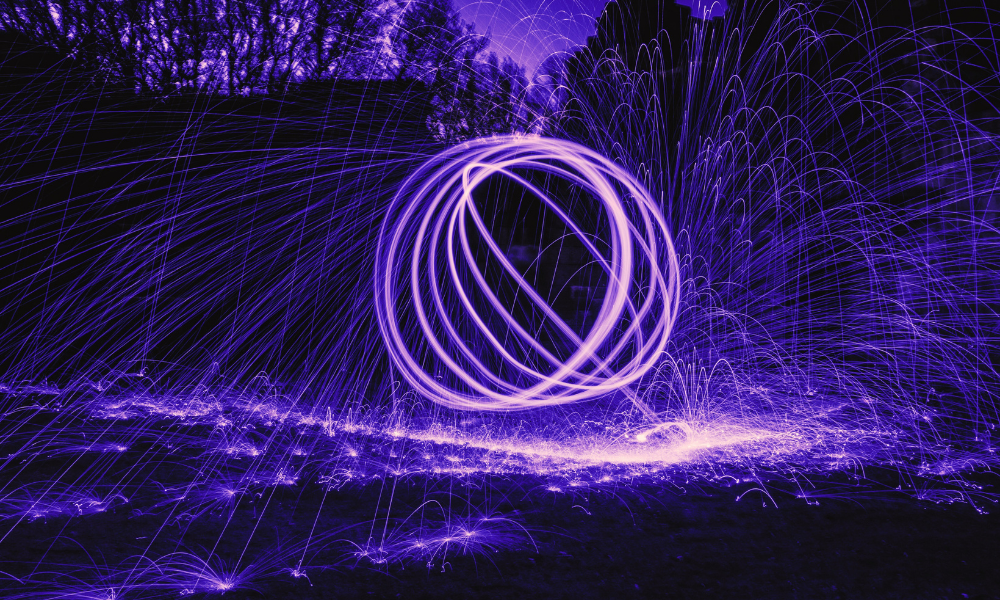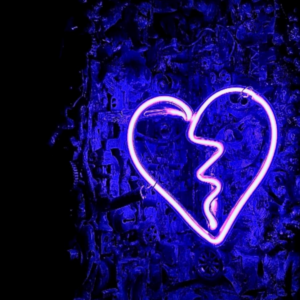Second Place Winner of Voyage’s Summer 2021 First Chapters Contest judged by Bestselling Author Sona Charaipotra
Content Warning: Child death
.
“Death has nothing to do with going away. The sun sets. The moon sets. But they are not gone.”
—Rumi
.
The dead are loud tonight.
More than usual I should say, since loud seems to be their default mode. What is it with October? The month ushers in the first chill to Chicago’s nights, a hint of the brutal cold that will engulf our city in the months to come. It’s almost like the dead sense winter coming too, but that’s silly. The unseen barrier that separates our world from theirs is—mostly—impenetrable.
The headstones in Eternal Hills are gaudy, rising waist-high in odd shapes like giant, crooked chess pieces. A woman’s disembodied laughter rides the air, full and ripe with joy. But it’s swallowed by the spectral scream of another, as shrill as a wind storm. I try to block them out and concentrate on lifting one foot and then the other. Soil squelches under my Vans’ thick soles, dampness seeping through the canvas sides.
An old man weeps. Someone croons a Chinese lullaby, begs for mercy in Dutch, cantillates a sacred scripture. I suck in breath after breath. I can’t lose myself in the cloud of voices. They’ll drown me if I do. I stagger forward. Stumble. The crumbling ivory edifices around me become a shifting maze my eyes can barely focus on.
Remember why you’re here!
I have to talk to the little girl… to help her family. And something else… Someone else… I finger the loose fabric of my hijab, the white one with dainty, blue roses like the pattern of a porcelain plate. It reminds me of Mama. Of her advice when I first wore it, her expert fingers folding the rectangular scarf to frame my face, “Jannat, always start by renewing your niyyah.”
The hope that maybe, maybe I can finally find my mama clears the dizziness from my head. A cool breeze wafts across my back. I yank up the hood of my baggy sweatshirt, huddling deeper inside the cotton, and enter the children’s section of the cemetery.
It should fill me with sorrow to see the tiny graves, most mere babies, and many of those marked with only one date. But while the voices are generally a mixed bag, it’s different here, where the children’s joy washes over me. They’re still loud, but in the same way any children are. They squeal and giggle and holler. One perk of my ability, since children don’t have to wait in Barzakh for Judgment Day, is this small patch of Jannah I’m allowed to experience on earth.
I imagine Wisteria’s parents were unprepared for her to die so young and had yet to worry about investing in a family plot. Maybe they’ll move her body when they can afford to, but for now, she rests here. Among the innocents.
Wisteria Crown. A swathe of moonlight reveals the letters etched on a pine-wood cross in lines too stark and rigid, unsuited to a six-year-old girl. They should be fanciful, curly, and more delicate. But then, they shouldn’t be here at all.
I shudder, head to toe. According to what I read in Baba’s official report last night, Wisteria was reported missing Saturday morning after her parents woke up at Rock Adventures campsite and didn’t find their daughter in her tent where they’d left her sleeping the night before. By Sunday afternoon, cadaver dogs located her body, buried not far off a hiking trail in the camp’s wooded area.
The Paw Patrol pajamas she’d worn to bed were gone, and instead, the girl’s corpse was dressed in a white gown with antique lacing, like a miniature bride. I bite my lip, releasing a burst of copper, when I come to the final, brutal detail. Wisteria suffered blunt force trauma to the back of her head, the strikes so violent, they cracked open her skull, causing her brain to hemorrhage.
The autopsy didn’t produce any irregular results, and Wisteria’s body was released after twenty-four hours, her funeral held this morning. I brace myself to hear her story in her words, and kneeling in the cool grass beside the fresh-turned earth of her grave, I cup my hands in front of me and make dua, “Inna lillahi wa inna ilayhi raji’un.”
A sense of peace falls over me. I take a deep breath and direct my intention outward, reaching with my mind, stretching my heart. My soul. And when the hum of voices around me fades, I feel it.
I feel her.
Wisteria.
I feel her as she was. Not a dead girl. Not the victim of an unspeakable crime. Wisteria Crown is a sparkling soul, bursting with laughter and life. Her aura wraps me in a glowing lavender bubble. Sensing without seeing, I glimpse the glimmer of a gap-toothed smile, warm enough to melt the coldest of winter’s offerings. Then the other voices are extinguished until there’s only her, and me.
“Hello?” she says, timid, and slightly curious.
“Hello, Wisteria,” I say in my Trust Me Voice. Most souls don’t mind talking about how they died, but one can’t be too careful, and it’s always hit or miss with kids.
“How do you know my name?” she asks.
“It’s written on your marker, silly,” I tease.
She laughs, the bright sound out of place among the sad, gray stones that surround us. No doubt, Wisteria’s parents have ordered her the same, but were it up to me, her stone would be painted pink and covered with fuzzy fabric and glittery stickers. “What does the rest say?”
“It says: We will miss you until our hearts meet again.”
“That’s nice,” Wisteria says, and I can’t tell if she’s sad, or merely underwhelmed. “Where’s your marker?”
Gee, I’ve never been asked that before. “I’m not dead.”
“Are you sure?” she asks with such seriousness that, for a moment, I wonder if I’ve died without realizing it.
“Hold on.” I press my fingertips to my jugular vein until I find the soft patter of my pulse. “Yep, I’m still alive.”
“Then how will I know your name?”
I chuckle. “You could ask.”
She chuckles back. “What’s your name?”
“Jannat.”
“That’s pretty.”
“It means paradise,” I tell her. “Wisteria is a beautiful name, too.”
“Thanks,” Wisteria says. “Now, we’re not strangers anymore. So what do you want to play, new friend?”
“Actually…” My heart dips, and a heavy ache spreads like roots throughout my chest. “I’m hoping you can answer some questions.”
“Oh,” she says. “Do you want me to tell you what it’s like here? It’s the most wonderful place.”
I try to say no, that’s not what I wanted to ask, but the enthusiasm in her voice won’t let me. “Sure.”
“Where should I start?” Wisteria’s voice goes dreamy. “The food is the yummiest. The gardens are green, like really green, and you can’t taste every fruit that grows in them because there’s too many. And each one is different. Some are sweet and some are sour, but good sour, and some are salty.”
“Salty fruits?” I ask, grinning.
“Yes! It’s true!” she exclaims. “Weird, right? And you can taste everything, but better than before. The real, true flavor, not the fake one.”
I nod though she can’t see me. “Like having super-enhanced senses.”
“And I can pet all the animals,” Wisteria continues chattering. “They don’t bite here. And I have so many friends to play with and we can go wherever we want, whenever we want. And everything smells good. Even the air. Do you know what it smells like?”
“Tell me.”
“It smells like…” She inhales deeply. “Toothpaste! But I don’t have to brush my teeth anymore. And Mommy’s not here to tell me to, anyway.”
She stops short.
“What is it, Wisteria?”
She hesitates before asking, “When is Mommy coming?”
“I’m sure it won’t be much longer, or it won’t seem to be at least,” I say, sensing my opening. “But in the meanwhile, you could help your mommy.”
“She needs help?” Wisteria asks. “Is she sick? How high is her temperament?”
“No, not sick,” I explain, trying not to giggle at her adorable mistake. “But she misses you.”
“I miss her too.” Wisteria sighs.
“I’m sure you do,” I say. “And I bet you’d love to help her. Right?”
“Of course,” she says, and I picture her in my mind’s eye, nodding in earnest agreement as the lavender glow around me flickers and brightens in intensity.
I grind my teeth as a pull of sadness sinks my chest toward my stomach. This story won’t be easy, not for me to hear, and not for Wisteria to tell. To have to remember. “Your mom, your dad, and your brother, they want the person who did this to you to go to jail. I’m trying to help them figure out who that is. Could you tell me about that night?”
“Are you a police pup?” she asks. “Like Chase?”
“Yeah,” I say, although I’m unsure whom she means.
“Oh,” she whispers. “Do you think someone killed me?”
“Isn’t that what happened?” I stutter.
“No,” she says, but she doesn’t sound convinced. “Not exactly.”
“What do you mean?”
“There was someone… but they were trying to help.”
Could the killer have been someone Wisteria knew? Or a stranger, pretending to be a good Samaritan? Predators are known for using a variety of lures to trick their unsuspecting victims.
The first time I read the coroner’s report, knowing the bridal gown detail beforehand, my mind jumped straight to the most twisted scenario. Some weird cult had taken Wisteria and offered her to their leader in a mock wedding ritual. I can’t be blamed for my dark outlook. That sick stuff happens all the time, but in this case, there was no evidence of that type of assault.
“Why don’t you start from the beginning.” I reach into my pocket for a small notepad and my LED pen, the perfect accessory for graveyard scribblings. It writes upside down and withstands extreme temperatures. Hands down, best twenty bucks I ever spent. “After your mom put you to sleep in your tent.”
“Uhhh…” Wisteria thinks a moment. “Oh yeah, I snuck into the woods after everyone was asleep.”
“You went by yourself?”
“Mmm-hmm, I was fairy hunting.”
That sounds like something my eight-year-old cousin, Houda, would do. The thought sharpens my sadness like a stick. “And what happened in the woods?”
“I got lost. The fairies were hiding. I thought for sure they would want some of my Cheetos, but they didn’t come out. Then, I couldn’t find my way back to the tent. But I wasn’t scared.”
“Of course,” I agree. Attracting fairies with Cheetos? Also very Houda. The sad stick delivers a swift stab between my ribs. “Not a brave girl like you. But what did you do?”
“Just when I was about to fall down and sleep right there on the ground, I found the Fairy Queen’s house.”
“You did?” I suck on my bottom lip. I’m sure she found someone’s house, but I doubt it belonged to a fairy. Tell me you didn’t go inside, I want to say. But I can’t change the past. I can only search for the truth. I swallow, loosening the knot in my throat so my voice won’t betray my emotions. “And then?”
“I knocked on the door.”
“Did anyone answer?”
“The Fairy Queen.”
“Really?” It’s unusual for women to commit violent crimes, but when they do, their motives differ from their male counterparts.
Concealment and jealousy are top motives for men, followed closely by hatred, revenge, and the thrill of the hunt. Female killers are more likely to be motivated by either monetary gain or what they perceive as saving a loved one from a fate worse than death, and their targets are usually someone close to them.
“Who else?” Wisteria answers. “She took me in and gave me a dress. It made me itchy. And it smelled like dead flowers.”
By her tone, I imagine Wisteria wrinkling her nose. “Did she say why she wanted you to wear the dress?”
“Now who’s silly?” she asks. “My ’jamas were dirty. From falling in the woods.”
I guess that would sound reasonable to a young child. Wisteria probably wouldn’t have found the dress itself peculiar. Especially since she believed the woman was a fairy. “Can you tell me what happened next?”
“The queen went to the kitchen to make hot cocoa, and while she was gone, I looked around her house. I’d never been in a fairy house. Mommy would say that’s not polite, but I’m glad I did.”
My heart tightens. “You found something. Something you weren’t supposed to see.”
“I found… a room,” Wisteria says, her voice so low I have to strain to hear.
I sense this is where things take a dark turn, and I hate asking Wisteria to open that door in her mind, but I do it for the sake of justice, the only hope I can offer. “What was in the room, Wisteria?”
“Dead children.” Her small voice shakes. “Stacked on shelves. A whole room full. Oh, no, I was wrong. That wasn’t a fairy queen. It was a wicked witch in disguise, and I didn’t want to end up in that room, so I ran, ran, ran back to the woods.”
“Did the fairy—”
“The witch, you mean.”
“Did the witch follow you?” Blood races through my veins as though I’d been running through the woods myself.
“I don’t think so…”
By this point, I’m dying to know where this is going, but I don’t want to force Wisteria if it’s painful. “Are you okay?”
“My head,” Wisteria says, more a question than an answer.
“Yes,” I say. “Someone hurt your head. Can you tell me anything about them?”
“I don’t remember.”
I sigh. Did I go too fast? Push too hard? Or has the head injury blocked parts of Wisteria’s memory? I skim over the notes I’ve been writing. Fairies. Witches. Dead children. Clearly, some of this is embellishment. “I know this is hard, but can you tell me the last thing you do remember?”
“I fell,” she says. “This time, I couldn’t get back up. My ankle got twisted. I called for help, but no one came.”
But someone did come. There’s no way Wisteria hit her head that hard by herself. I swipe a hot tear as it rolls down my cheek. “I’m sorry.”
“Why?” she asks. “It’s not your fault. It’s mine.”
“Oh, sweetheart,” I say. “How could you think it was yours?”
“I…” Wisteria inhales sharply. “I was crying. Wilder says it’s the most annoying sound on earth. He covers his ears and makes a throw-up face.”
Wilder. I pull the name up from my mental file. Wisteria’s eight-year-old brother. My stomach drops at the idea of Wisteria thinking she’d done something wrong by crying, but I feel like we’re getting close to the truth. “Do you remember anything else?”
“The Angel of Mercy came and took my soul from my body,” Wisteria says, matter-of-factly. “It slipped right out, like a fish. Then the angel carried me up, up, up, up, up all the way to the heavens.” She pauses to catch a breath. “Will that help Mommy?”
“I think so,” I say, although I’m not sure I’ve learned anything useful. I tuck the notepad back inside my pocket. I’ll transfer my notes to my full-sized journal later, and maybe I can sort through the details and find some real clues hidden in the nonsense. “Thank you, Wisteria.”
“Are you coming?” she asks in a smiley, sunshine-y voice.
“Where?”
“I’m going to visit my great-grandma. And she always bakes enough cookies to share.”
“That sounds lovely,” I say. “But I don’t think I can.”
“Someday?” Wisteria asks.
“Someday,” I agree, adding insha’Allah in my head. “And Wisteria, can I ask one last favor?”
“Sure. What?”
Tenuous hope flutters under my breastbone, and I send up a silent dua for Mama. Oh Allah, forgive me, my parents, and have mercy on them, just as they cared for me when I was little.
“Could you ask your great-grandmother to check around and find out whether anyone has had contact with a soul by the name of Camille Jaouhari?”
While the dead have no contact with the living, they do interact with one another. And new arrivals are instantly met by the questions of family members, such as, “Is so-and-so still alive?”
And if the answer to this question is no, it means the person has gone to the other side of Barzakh.
If I’m sure of one thing, it’s that my mama didn’t go to the bad side. That’s simply not possible. She was a good person to the marrow of her bones. A good mother, and my Islamic Studies teacher tells us Jannah is under the feet of mothers.
But so far, none of the dead I’ve asked have seen her, so either she’s still alive…
Or her soul is lost.
That shouldn’t be possible either, but if there’s any chance it is, I have to help her.
“Camille Jaw… hari,” Wisteria repeats. “Got it.”
When the purple bubble around me ebbs and fades, the voices rush back in a seething swarm.




